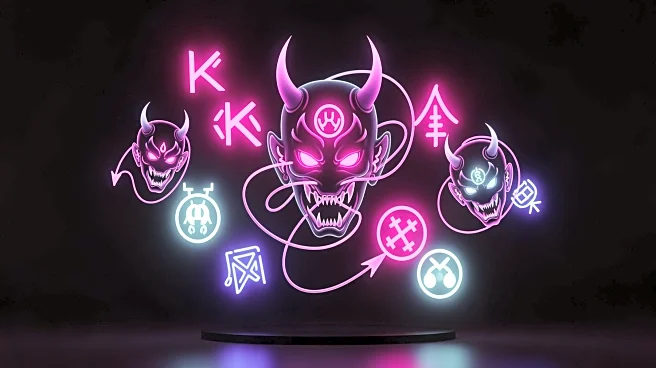What's Happening?
Netflix has announced a licensing agreement with toy manufacturers Mattel Inc. and Hasbro Inc. to produce a range of merchandise based on its animated film 'KPop Demon Hunters.' The film, which features
a trio of singers who battle demons, has become a global sensation since its release in June, amassing over 325 million views in its first 91 days. The partnership will see the creation of dolls, action figures, plush toys, and youth electronics, expanding Netflix's footprint in the retail space. This move is part of Netflix's broader strategy to leverage the popularity of its content through brand partnerships and physical retail experiences, including the upcoming launch of Netflix House locations.
Why It's Important?
The collaboration between Netflix, Mattel, and Hasbro signifies a strategic expansion into the retail market, allowing Netflix to capitalize on the popularity of its content beyond streaming. This partnership is expected to enhance fan engagement and generate additional revenue streams through merchandise sales. For Mattel and Hasbro, the deal provides an opportunity to tap into the global fanbase of 'KPop Demon Hunters,' potentially boosting their market presence and sales. The move reflects a growing trend among streaming services to diversify their business models and create immersive experiences that deepen consumer loyalty.
What's Next?
Netflix plans to open several Netflix House locations, which will offer experiences based on its programs and sell related merchandise. This initiative is likely to further integrate Netflix's content into consumer lifestyles, creating new avenues for fan interaction and brand loyalty. As the partnership unfolds, stakeholders will be watching for the impact on sales and consumer engagement, as well as potential expansions into other popular Netflix franchises.
Beyond the Headlines
The partnership highlights the increasing convergence of entertainment and retail, as streaming platforms seek to monetize their intellectual property through physical products. This trend raises questions about the future of content consumption and the role of merchandise in building brand ecosystems. Additionally, the collaboration underscores the cultural impact of KPop and its ability to transcend traditional media boundaries, influencing global consumer markets.












